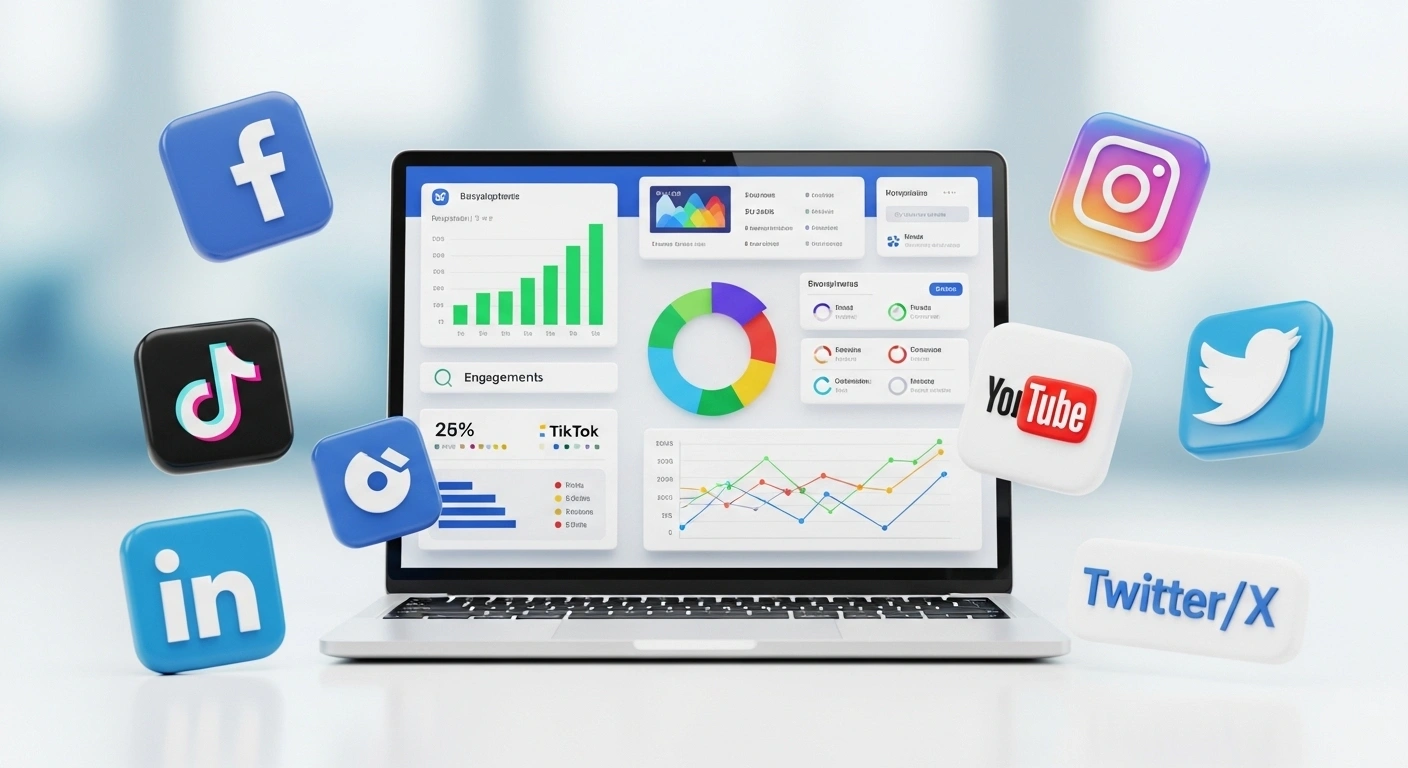Digital marketing has become the foundation of modern business success. In a world where everything is connected through the internet, a strong digital presence is no longer optional—it’s essential. Businesses that invest in online marketing not only reach larger audiences but also build stronger, long-term relationships with customers.

This in-depth guide will help you understand what digital marketing is, its importance, and how different strategies—like SEO, social media, and AI—are reshaping the future of online business growth.
What Is Digital Marketing?
Digital marketing is the process of promoting a brand, product, or service using online platforms and digital technologies. It includes everything from search engine optimization and content creation to social media campaigns and paid advertisements.
Unlike traditional marketing, which relies on TV, print, or billboards, digital marketing allows you to track your performance, measure ROI, and communicate directly with your audience in real-time.
In simple terms, it’s all about delivering the right message to the right audience at the right time through digital channels.
Why Digital Marketing Is Vital for Businesses Today
In today’s competitive environment, having an online presence is the lifeblood of every business. Whether you’re a startup or an established enterprise, digital marketing helps you connect, engage, and grow efficiently.
Here are a few reasons why it matters:
Reach a global audience: Your potential customers are just one click away.
Targeted marketing: Reach people based on interests, demographics, and behavior.
Measurable performance: Every click and conversion can be tracked and analyzed.
Cost efficiency: Achieve greater visibility with less spending than traditional ads.
Digital marketing levels the playing field—allowing small businesses to compete with large brands and reach customers worldwide.
Key Elements of Digital Marketing
Successful digital marketing involves several components working together in harmony. Below are the most effective pillars of an online marketing strategy in 2025.
1. Search Engine Optimization (SEO)
SEO is the backbone of digital marketing. It involves optimizing your website’s structure, content, and keywords to help it appear higher in search engine results. A well-optimized website not only increases organic traffic but also improves credibility and trust.
Search engines like Google prioritize websites that offer valuable content, fast performance, and great user experience.
To learn more about effective SEO strategies, visit this comprehensive guide on SEO services, which explains how professional SEO helps businesses achieve higher rankings and sustainable growth.
2. Content Marketing
Content is the heart of digital marketing. Through blogs, videos, infographics, and case studies, you can educate, inform, and inspire your audience. Quality content attracts users organically and positions your brand as a thought leader in the industry.
The secret lies in creating content that solves real problems for your audience—helping them make better decisions while subtly promoting your brand.
Consistency and authenticity make content marketing one of the most powerful digital strategies.
3. Social Media Marketing
Social media has transformed the way businesses interact with customers. Platforms like Instagram, Facebook, LinkedIn, and TikTok provide brands the opportunity to engage with audiences, build communities, and create awareness through creative storytelling.
It’s not just about posting regularly—it’s about understanding your audience and building meaningful conversations around your brand.
For practical strategies and expert advice, explore this resource on social media marketing to learn how to create engaging content that drives results.
4. Pay-Per-Click (PPC) Advertising
PPC advertising allows brands to pay only when someone clicks on their ad. It’s one of the fastest ways to generate leads, increase traffic, and boost visibility.
Google Ads and social platforms provide advanced targeting features, helping you reach customers based on specific keywords, locations, and behaviors.
While PPC offers immediate results, it requires continuous optimization to ensure every dollar delivers value.
5. Email Marketing
Email marketing remains a reliable way to nurture relationships with your audience. Personalized email campaigns can increase retention, build trust, and encourage repeat sales.
Automation has made it easier than ever to send the right message at the right moment. From welcome emails to product recommendations, personalized communication makes your customers feel valued.
6. Artificial Intelligence and Automation
AI is redefining how digital marketing works. From chatbots to predictive analytics, artificial intelligence helps marketers deliver personalized experiences, understand user behavior, and make smarter decisions.
AI tools can analyze customer data, predict future trends, and even create tailored campaigns automatically. This saves time, reduces costs, and improves accuracy.
To explore this further, read this insightful guide on AI and digital marketing to discover how AI is transforming customer engagement and marketing efficiency.
How to Create an Effective Digital Marketing Strategy
A strong strategy is what separates successful brands from the rest. Here’s how to build a data-driven and result-oriented digital marketing plan.
Step 1: Define Your Goals
Every strategy begins with a clear objective. Identify what you want to achieve—brand awareness, website traffic, lead generation, or online sales.
Having measurable goals makes it easier to track performance and refine your approach over time.
Step 2: Know Your Audience
Understanding your audience is key to success. Develop buyer personas that reflect their needs, challenges, and preferences. When you know who you’re talking to, your message becomes more impactful.
Step 3: Select the Right Platforms
Not every marketing channel suits every business. Some audiences respond better to visuals on Instagram, while others prefer professional insights on LinkedIn.
To find the right mix of strategies for your business, explore Fast Digital 360’s professional marketing services. They provide customized solutions designed to help businesses achieve their unique goals.
Step 4: Develop High-Quality, Consistent Content
Publishing valuable, engaging, and consistent content keeps your brand visible and relevant. Use a mix of formats—blog posts, short videos, infographics, or podcasts—to maintain audience interest.
Your content should educate, entertain, or solve problems—while subtly promoting your services.
Step 5: Analyze and Optimize Performance
Data is your best guide in digital marketing. Tools like Google Analytics and SEMrush allow you to track user behavior, campaign performance, and conversion rates.
By reviewing data regularly, you can identify what’s working and refine your approach to achieve even better results.
Future Trends in Digital Marketing
The digital marketing world is evolving rapidly. To stay competitive, businesses must stay ahead of new technologies and audience behaviors. Here are the most promising trends in 2025:

AI-driven personalization: Tailored messages and campaigns for every customer.
Voice and visual search: Optimizing content for AI assistants and camera-based searches.
Sustainability-focused branding: Consumers prefer eco-conscious and ethical brands.
Interactive content: Polls, AR filters, and immersive media are redefining engagement.
Those who adapt early to these trends will enjoy stronger connections and lasting brand loyalty.
Why Work with Digital Marketing Experts
Managing digital campaigns can be complex and time-consuming. Partnering with professionals helps businesses save time and achieve faster, measurable results.
Expert agencies bring in-depth knowledge, advanced tools, and strategic insight that ensure your marketing efforts deliver real value.
If you’re ready to grow your business through expert-led strategies, don’t hesitate to contact Fast Digital 360. Their experienced team can help you design a customized plan that fits your brand’s goals.
Final Thoughts
Digital marketing has completely transformed how businesses connect with customers. It’s more than just promoting a product—it’s about building trust, adding value, and creating meaningful relationships.
By combining SEO, content creation, social media engagement, and AI-powered tools, any business can achieve lasting growth and visibility in the online world.
The key is to stay consistent, innovative, and data-driven. Embrace the evolving trends of digital marketing today—and set your business up for success in the years ahead.